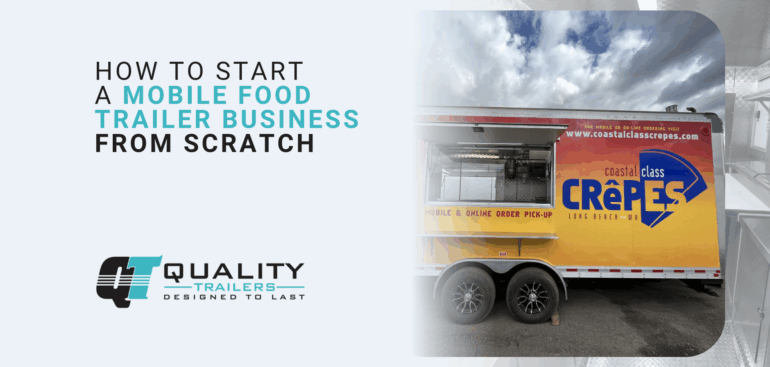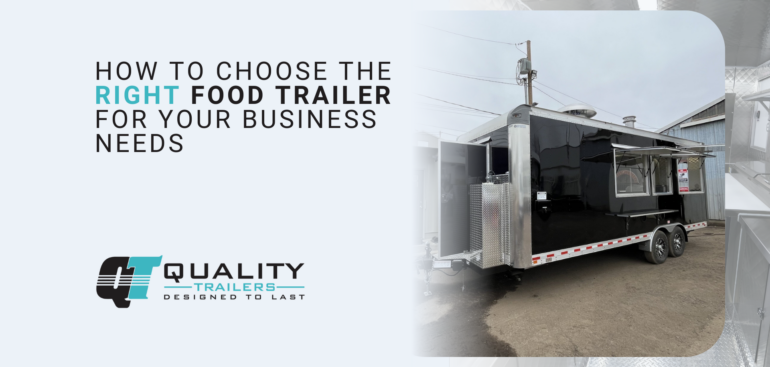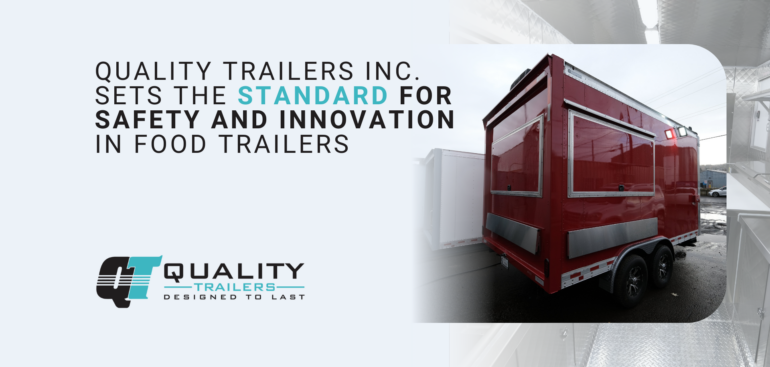Starting a mobile food trailer business represents one of the most exciting opportunities in today’s culinary landscape. With lower overhead costs compared to traditional restaurants and the flexibility to reach customers wherever they gather, food trailers have become increasingly popular among aspiring entrepreneurs. This comprehensive guide will walk you through every essential step needed to launch your own successful mobile culinary venture.
Understanding the Mobile Food Trailer Industry
The mobile food service industry has evolved significantly from simple hot dog carts to sophisticated culinary operations serving gourmet cuisine. Today’s food trailers feature professional-grade kitchens capable of producing restaurant-quality meals while maintaining mobility and efficiency. For insights on industry trends, check out our latest blog posts on mobile food business strategies.
Market research indicates that successful food trailer businesses can generate substantial revenue, with some operations earning six-figure annual incomes. However, success requires careful planning, dedication, and understanding of both culinary arts and business management. The industry’s competitive nature demands operators who can combine excellent food quality with efficient operations and effective marketing strategies.
This evolution has opened doors for countless entrepreneurs to enter the food service industry with relatively modest initial investments. The growth reflects changing consumer preferences for convenient, high-quality dining options and the entrepreneurial spirit of chefs and food enthusiasts who want to share their culinary creations without the massive investment required for a brick-and-mortar restaurant.
Developing Your Food Trailer Concept
Creating a unique and viable concept forms the foundation of any successful food trailer business. Your concept should reflect your culinary expertise, target market preferences, and local competition analysis. Consider what type of cuisine excites you most and where gaps exist in your local mobile food scene. Whether specializing in authentic ethnic cuisine, fusion dishes, or comfort food classics, your concept should offer something distinctive that sets you apart from competitors. Learn more about concept development in our food trailer startup guide.
Menu Planning and Development
Menu development requires balancing customer appeal with operational efficiency. Limited kitchen space in a mobile food trailer means focusing on dishes that can be prepared quickly without sacrificing quality. Many successful operators build their menus around signature items that can be customized with various toppings or sides, allowing variety while maintaining streamlined operations. The key is finding that sweet spot between offering enough variety to attract different customers while keeping operations manageable within your mobile kitchen constraints.
Creating a Comprehensive Business Plan
A well-crafted business plan serves as your roadmap to success and proves essential when seeking financing or investors. Your plan should detail your concept, target market analysis, competitive landscape assessment, marketing strategies, and financial projections. Include specific information about startup costs, operating expenses, revenue forecasts, and break-even analysis. Get accurate cost estimates for your project with our custom-built food trailer pricing calculator.
Financial planning must account for both one-time startup costs and ongoing operational expenses. Initial investments typically include the trailer purchase or lease, kitchen equipment, permits and licenses, insurance, initial inventory, and marketing materials. Operating expenses encompass food costs, labor, fuel, maintenance, commissary fees, and ongoing permit renewals. Realistic financial projections help ensure adequate capitalization and sustainable operations.
Legal Requirements and Permits
Navigating the regulatory landscape represents one of the most challenging aspects of starting a food trailer business. Requirements vary significantly by location, making thorough research essential. Most jurisdictions require multiple permits and licenses, including business licenses, health department permits, fire safety certificates, and parking or vending permits. Each permit involves specific requirements and inspection processes that must be completed before operations can begin. Our compliance blog series provides detailed guidance on navigating permit requirements.
Health Department Compliance
Health department regulations typically mandate commissary kitchen usage for food preparation and storage, regular inspections, food handler certifications for all staff, and compliance with local health codes. Building relationships with health department officials and understanding their requirements helps streamline the permitting process and ensures ongoing compliance. Many new operators underestimate the time required for permit approval, so starting this process early proves crucial for timely launch.
Selecting and Customizing Your Mobile Food Trailer
Choosing the right trailer significantly impacts your operation’s efficiency and success. Modern food trailers come in various sizes and configurations, from compact units suitable for specialized menus to larger trailers equipped with full commercial kitchens. When evaluating options, consider your menu requirements, expected sales volume, and local regulations regarding trailer dimensions. Request a custom quote to explore options tailored to your specific needs.
Professional Design Considerations
A professional mobile food trailer design incorporates efficient workflow patterns, adequate storage, proper ventilation, and compliance with health and safety codes. Custom-built trailers allow optimization for your specific menu and operational needs, while used trailers may offer cost savings but require careful inspection to ensure code compliance and equipment functionality. The layout should minimize movement between stations during service while maximizing storage capacity for ingredients and supplies. Read our design tips blog post for expert insights on optimizing your trailer layout.
Essential Equipment and Kitchen Setup
Outfitting your mobile food kitchen trailer requires careful selection of commercial-grade equipment that maximizes efficiency within limited space. Essential equipment typically includes cooking appliances appropriate for your menu, refrigeration units, food prep surfaces, hand-washing stations, and three-compartment sinks.
Equipment selection should prioritize versatility, durability, and energy efficiency. Many operators choose equipment that serves multiple functions to maximize space utilization. Proper ventilation systems prove crucial for maintaining comfortable working conditions and meeting fire safety requirements. Investment in quality equipment pays dividends through improved reliability and reduced maintenance costs over time. Each piece must meet health department specifications and integrate smoothly into your workflow design.
Location Strategy and Parking Permits
Success in the food trailer business often depends more on location than any other single factor. Identifying high-traffic areas with your target demographic requires research and sometimes trial and error.
Securing Prime Locations
Popular locations include business districts during lunch hours, brewery and bar districts for evening service, special events and festivals, and permitted spots near parks or tourist attractions. Securing regular parking locations typically involves obtaining specific permits or agreements with property owners. Many cities designate food truck zones or pods where multiple vendors can operate together. Private property arrangements often prove more flexible but require negotiation with property owners and may involve rental fees or revenue-sharing agreements.
Building Your Brand and Marketing Strategy
Effective branding differentiates your food trailer mobile kitchen from competitors and builds customer loyalty. Your brand encompasses everything from your trailer’s visual design and logo to your social media presence and customer service approach. Consistent branding across all touchpoints helps establish recognition and trust with customers.
Social media marketing proves particularly effective for food trailers, allowing real-time location updates, menu announcements, and customer engagement. Platforms like Instagram showcase your food through appealing photography, while Twitter and Facebook enable quick communication about daily locations and special offerings. Building an email list and loyalty program encourages repeat business and word-of-mouth marketing. Remember that in the mobile food business, your customers need to find you, making consistent communication about your location essential for success.
Staffing and Operations Management
Efficient operations require careful planning of staffing needs, prep schedules, and service systems. Many food trailer businesses start with owner-operators handling all aspects, but growth typically necessitates hiring additional staff.
Developing Operational Systems
Key considerations include determining optimal crew size for various service periods, developing training programs ensuring consistent food quality and service, and creating systems for inventory management and cash handling. Operational efficiency improves through standardized recipes, prep lists, and opening/closing procedures. Time management proves crucial when balancing prep time, travel between locations, service hours, and cleaning requirements. Developing smooth operational systems early helps maintain quality and profitability as business volume grows.
Financial Management and Tracking
Sound financial management ensures long-term sustainability and enables strategic growth. Implementing robust accounting systems from the start helps track profitability by location and menu item, identify cost-saving opportunities, and prepare accurate tax filings. Key metrics to monitor include food cost percentages, labor costs, daily sales averages by location, and customer transaction values.
Planning for Growth
Growth strategies might include adding additional trailers to serve multiple locations simultaneously, expanding into catering services for private events, developing branded products for retail sale, or eventually transitioning to a brick-and-mortar location. Each growth path requires careful analysis of market demand, capital requirements, and operational complexity. Success often comes from perfecting operations with one trailer before expanding, ensuring systems and quality standards can scale effectively.
Understanding Insurance Needs
Protecting your investment through appropriate insurance coverage proves essential for any mobile food trailer business. General liability insurance protects against customer injuries or property damage claims, while commercial auto insurance covers the vehicle and trailer during transport.
When researching mobile food trailer insurance options, work with agents experienced in food service businesses who understand the unique risks involved. Additional coverage considerations include equipment breakdown protection, business interruption insurance, and workers’ compensation for employees. Policy costs vary based on factors including location, menu type, annual revenue, and claims history. Adequate coverage protects both your business assets and personal finances from potential lawsuits or disasters.
Adapting to Challenges and Market Changes
The food trailer industry presents unique challenges requiring flexibility and resilience. Weather conditions can dramatically impact sales, while mechanical breakdowns might force unexpected closures. Successful operators develop contingency plans for common challenges and maintain emergency funds for unexpected repairs or slow periods. Market adaptation involves staying current with food trends, adjusting menus seasonally, and responding to customer feedback. Regular menu analysis helps identify underperforming items for replacement while protecting profitable favorites.
Building Industry Relationships
Building relationships within the mobile food community provides valuable support and information sharing about locations, events, and operational tips. Many cities have food truck associations that advocate for operators and coordinate group events. These connections often lead to catering opportunities, festival invitations, and valuable advice from experienced operators.
Here are essential steps for launching your mobile food business:
- Research local regulations thoroughly before investing in equipment or mobile food trailer for sale options • Develop a unique concept that fills a genuine market gap • Create realistic financial projections including all startup and operating costs • Build strong relationships with suppliers, property owners, and fellow operators • Invest in quality equipment and professional mobile food trailer design from experienced manufacturers
Common Mistakes to Avoid
Learning from others’ experiences helps avoid costly mistakes when starting your food trailer business. Underestimating startup costs ranks among the most common errors, as many new operators fail to account for all permits, equipment, and operating capital needs. Choosing locations based solely on personal preference rather than customer traffic patterns often leads to disappointing sales. Neglecting marketing efforts assumes customers will automatically find your trailer, but success requires active promotion and engagement.
Maintaining Quality Standards
Compromising on food quality to reduce costs ultimately damages reputation and customer loyalty. Failing to maintain proper insurance coverage exposes operators to potentially devastating financial losses from accidents or lawsuits. Perhaps most importantly, many new operators burn out from overwork, underlining the importance of building sustainable schedules and operational systems from the start.
Why Choose Quality Trailers Inc for Your Custom Food Trailer Project
When embarking on your mobile food trailer journey, partnering with experienced manufacturers makes all the difference in your success. Quality Trailers Inc brings over 23 years of industry expertise to every project, having established operations in 2001 and specializing in custom food trailers since 2010. Our Oregon-based family business has evolved from construction trailer manufacturing to becoming recognized leaders in the food trailer industry, combining traditional craftsmanship with innovative solutions like our solar panel food trailer options introduced in 2016.
Every food trailer mobile kitchen we produce meets the highest standards of quality and compliance. Our team includes experienced designers who use CAD technology to create detailed plans ensuring your trailer meets all local health department requirements. We understand that permits and code compliance can be challenging aspects of starting your business, which is why every unit we manufacture is built to meet or exceed regulatory standards. Our commitment to durability, efficiency, and customer satisfaction shows in every detail of our work.
What sets Quality Trailers Inc apart is our comprehensive approach to each project. We don’t just build trailers; we create mobile kitchens designed for long-term success. Our experienced project managers guide you through every stage of the build process, from initial design concepts to final delivery. With our proven track record and deep understanding of what food trailer operators need to succeed, we deliver customized solutions that help transform your culinary dreams into profitable reality.
Frequently Asked Questions
How much does it cost to start a mobile food trailer business?
Startup costs typically range from $50,000 to $175,000 depending on whether you purchase new or used equipment, the size and complexity of your trailer, and local permit requirements. This includes the trailer, kitchen equipment, initial permits and licenses, insurance, initial inventory, and working capital for the first few months of operation. Additional costs may include commissary kitchen rental fees, marketing materials, and point-of-sale systems. Many operators find that starting with realistic budget expectations and some financial cushion helps navigate the inevitable unexpected expenses during launch.
Do I need culinary training to start a food trailer business?
While formal culinary training isn’t legally required, food safety certification is mandatory in most jurisdictions. Many successful food trailer operators come from diverse backgrounds but share a passion for food and commitment to quality. However, understanding food safety principles, basic culinary techniques, and efficient kitchen operations proves essential. Consider taking food safety courses, working in restaurant kitchens, or partnering with experienced chefs if you lack culinary background. The most important qualities are dedication to learning, willingness to work hard, and genuine enthusiasm for serving great food.
What permits and licenses do I need to operate legally?
Required permits vary by location but typically include a business license, health department permit, fire safety certificate, and vendor or parking permits. Some jurisdictions also require commissary agreements, sales tax permits, and employer identification numbers if hiring staff. The permitting process can take several weeks to several months, so starting early is crucial. Building positive relationships with regulatory officials often smooths the approval process and helps ensure ongoing compliance.
How do I find the best locations for my food trailer?
Successful location scouting combines research, networking, and experimentation. Start by identifying areas where your target customers gather, such as business districts, college campuses, or entertainment areas. Contact property owners and local business associations about parking opportunities. Attend food truck gatherings to learn from experienced operators about profitable locations. Track sales data by location and time to identify your most profitable spots and optimize your schedule accordingly. Remember that the best locations often require persistence and relationship building to secure.
What are the typical operating hours for a food trailer business?
Operating hours vary significantly based on concept and target market. Breakfast-focused trailers might operate from 6 AM to 11 AM on weekdays near office buildings. Lunch operations typically run from 11 AM to 2 PM in business districts. Late-night trailers often serve bar districts from 10 PM to 3 AM on weekends. Many operators work split schedules, serving lunch crowds before relocating for dinner service. Successful scheduling balances revenue potential with operational costs and quality of life considerations. Finding your optimal schedule often requires experimentation and careful tracking of sales patterns.




